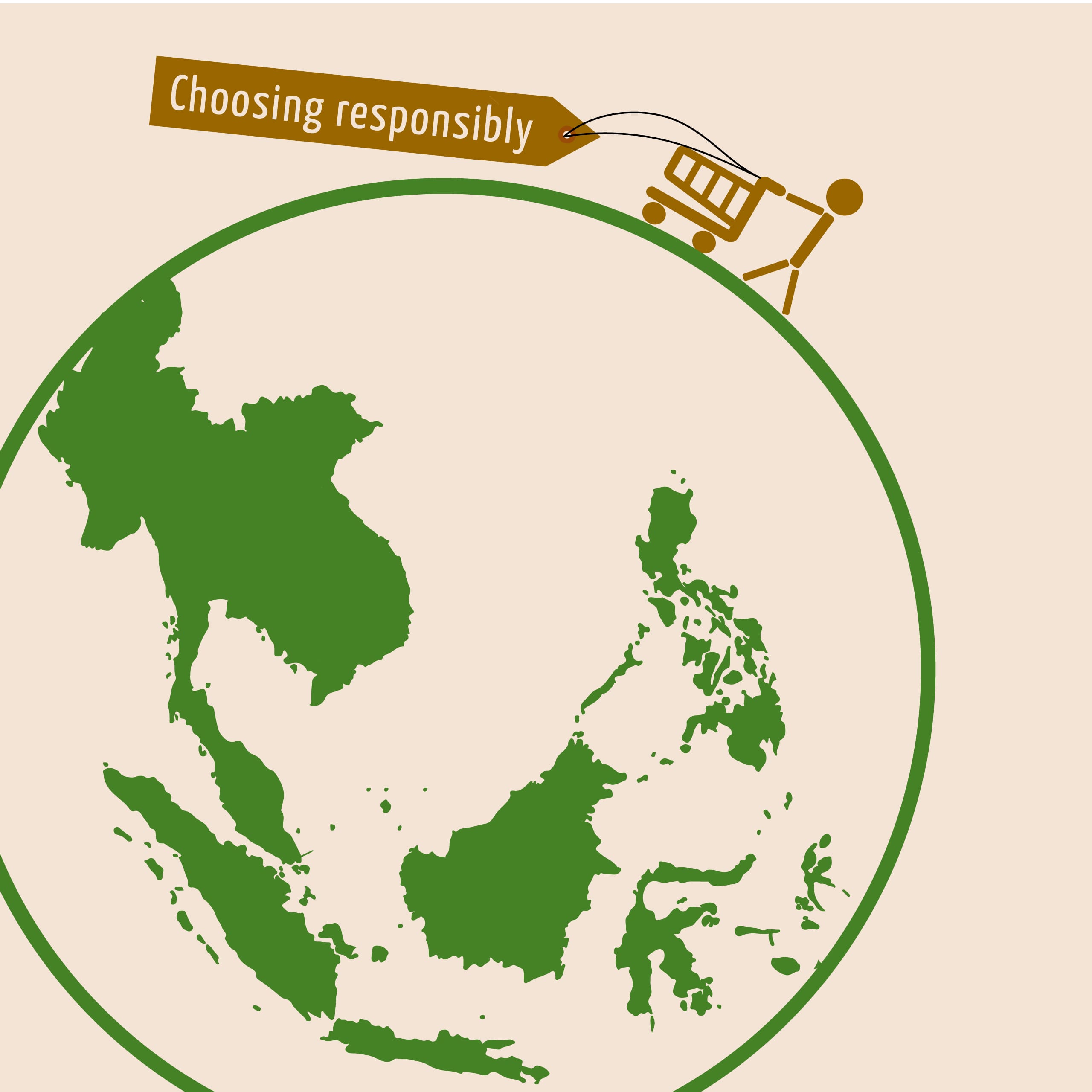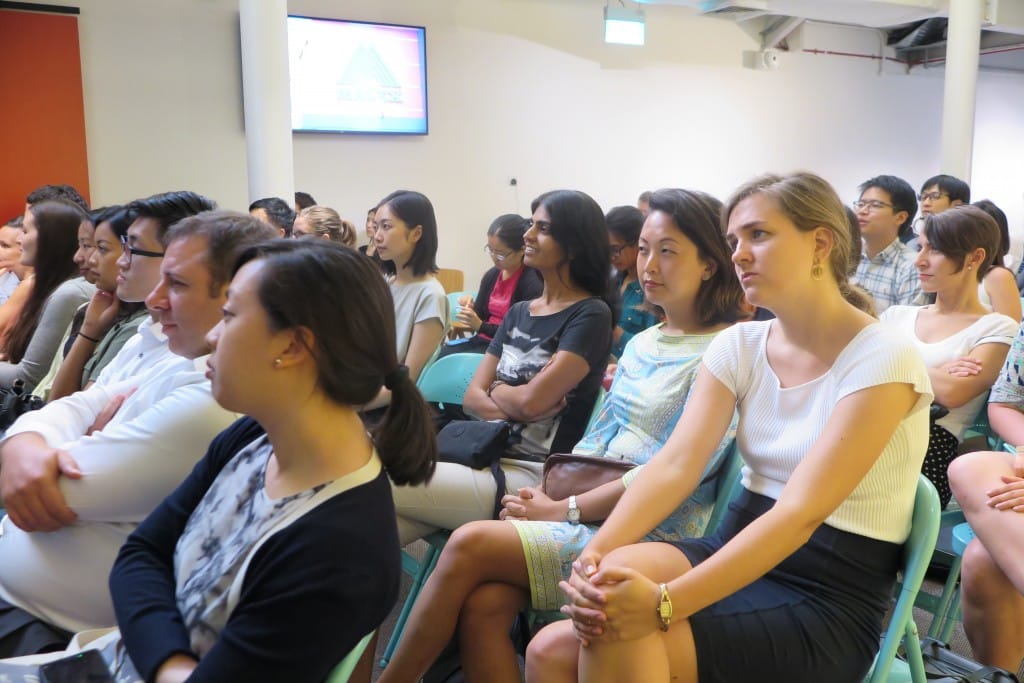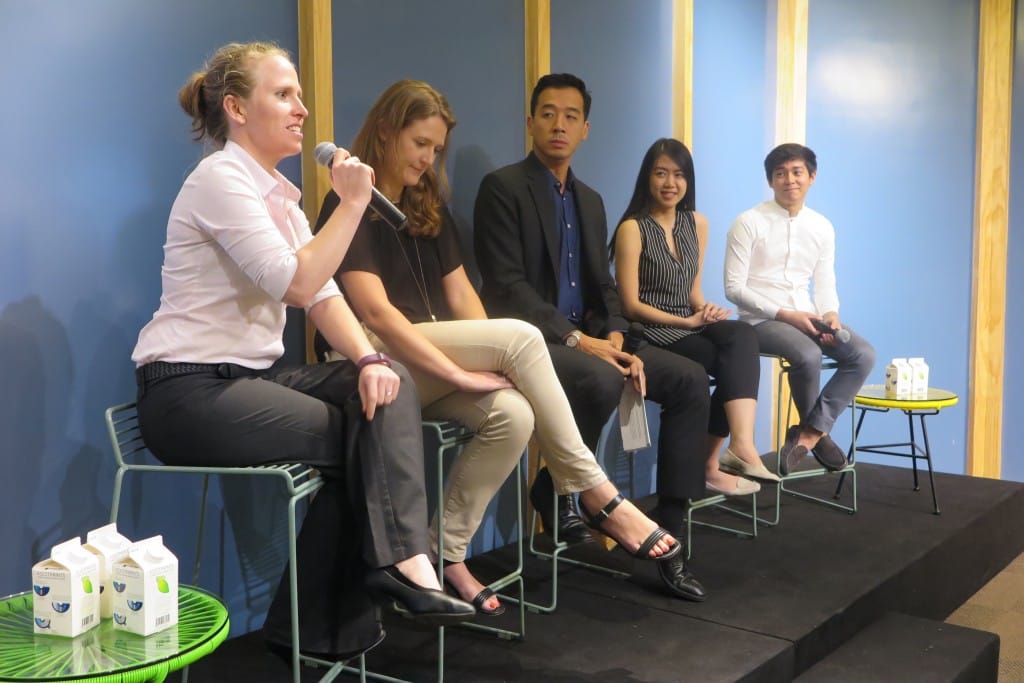US President Donald Trump’s move to withdraw America from the Paris Agreement has once again sparked global attention about the fight against climate change and the need to be sustainable. But what does this mean for our own consumption habits and what we do as individuals? As part of our Global Citizens Singapore programme, we held a session on “The Future of Consumer Choice and Responsibility” at The Working Capitol on 14 June 2017.
We showed two episodes of a recent documentary series, “Trash Trail” by Channel NewsAsia, followed by a panel discussion with Ms. Laura Allen, Co-Founder and COO, Gone Adventurin’, Ms. Sarah Cragg, Social Mission Activism Manager, Ben & Jerry’s, Asia & New Markets, Ms. Maggie Lee, Sustainability Program Lead, P&G Global Beauty, and Mr. Raye Padit, Co-Founder, Connected Threads Asia. The panel was moderated by Mr. Nicholas Fang, Executive Director, SIIA.
Here’s some highlights from the conversation. More photos from the session are available on our Facebook page.
Although Trump’s decision to pull the US out of the Paris deal is a setback, it has focused global attention on climate issues. Many countries, ranging from France to China, have come forward to pledge their continued support for reducing emission. Several American states and cities have also promised to still meet the Paris commitments. For individuals, the situation is an important reminder that the environment matters.
Despite the surge in global interest on climate change, there is still a perception that it is mostly Westerners rather than Asians that care about responsible consumption and other environmental issues. Is this true? A regular Nielsen survey, the Nielsen Global Corporate Sustainability Report, that suggests Asian consumers actually lead the world in willingness to pay more for sustainable products.
But the panel agreed that in practice, the general public in Europe, America and Australia are still more conscious about environmental issues than Asians. Asians may be interested in buying sustainable products, but often they do not actually act on it. However, Asia is catching up.
The Nielsen report indicates it is mostly millennials who think about sustainability when making purchases. But the panel pointed out that older people aren’t necessarily set in their ways. For example, when Hong Kong implemented a levy on the use of plastic bags, older shoppers were the first to catch on.
But does ‘voting with your wallet’ really make a difference? The panel noted that fundamentally businesses do have to make money, so they must listen to consumers – who can affect businesses with their patronage, or by avoiding their products. There has been a rise in labels certifying that a product is ethical or sustainable, such as the B Corp label, the FAIRTRADE mark, or Round Table on Sustainable Palm Oil (RSPO) Certification.
One of our event participants asked the panel if the focus should really be on consumers, as industries may generate more waste than consumer products. But industrial waste is different. In Singapore, about 80 per cent of waste is indeed generated by industry, but the recycling rate from industry is also high, around 90 per cent. Industrial waste is often single stream materials, such as pure plastic that is easy to repurpose, compared to household waste that may be contaminated with food or other materials. Thus there is still a need for the public to be more aware about these issues.
The recent 2015 transboundary haze crisis in Southeast Asia is a good example of how the public has responded to environmental concerns. In 2015, Asia Pulp and Paper (APP) suppliers were accused of starting fires, leading to some products being temporarily pulled off supermarket shelves in Singapore.
However, both panellists and our event participants acknowledged that it is often health concerns that motivate members of the public, not concern about the environment per-se. The haze crisis is an example, with people only being mobilised due to the obvious threat of air pollution and potential respiratory illnesses.
Ultimately, more still needs to be done to change our behaviour and patterns of consumption. For instance, Singapore generates more textile waste per-capita from discarded clothes, shoes and household furnishings than the United Kingdom and Japan. This is combined with a very low textile recycling rate of less than 8 per cent.
Closing the session, SIIA Executive Director Nicholas Fang noted that while Singapore is a small country, and our total amount of consumption is relatively low compared to the rest of the world, it is still important to change perceptions and take action. Singapore is also viewed as a thought leader, and as a global city with global citizens, we do have a responsibility to spread ideas and behaviour that can benefit the world.
Thanks to The Working Capitol for the venue, Channel NewsAsia for allowing us to screen the documentary episodes, as well as Ben & Jerry’s, GTCL – Gourmet Taste Conscious Life, and Ripe Craft Juice for refreshments at the event.
Original Event Synopsis:
Consumer choices have environmental and social implications. The public’s response to the haze crisis in recent years shows that many people in our region do care about whether the products on supermarket shelves are sustainable. However, without a crisis to draw our attention, we tend to look at the price tag when deciding what to buy, rather than thinking about climate change, packaging waste, or human and animal rights.
Event Details
Date: Wednesday, 14th June 2017
Time: 6:00pm – 9:00pm (Registration Reception starts at 6pm; Talk begins at 6:45pm)
Venue: The Commons @ The Working Capitol
1 Keong Saik Road, Singapore 089109
*Admission is free and all young professionals are welcome to join.
**As seats are limited, only those registered will be allowed in. Please register your interest here by 12th June 2017.
About the Speakers
Ms. Maggie Lee
Sustainability Lead, Procter & Gamble
Ms. Sarah Cragg
Social Mission Advocacy Manager, Ben & Jerry’s, Asia & New Markets
Ms. Laura Allen
Co-Founder and COO, Gone Adventurin
Mr. Raye Padit
Co-Founder, Connected Threads Asia






